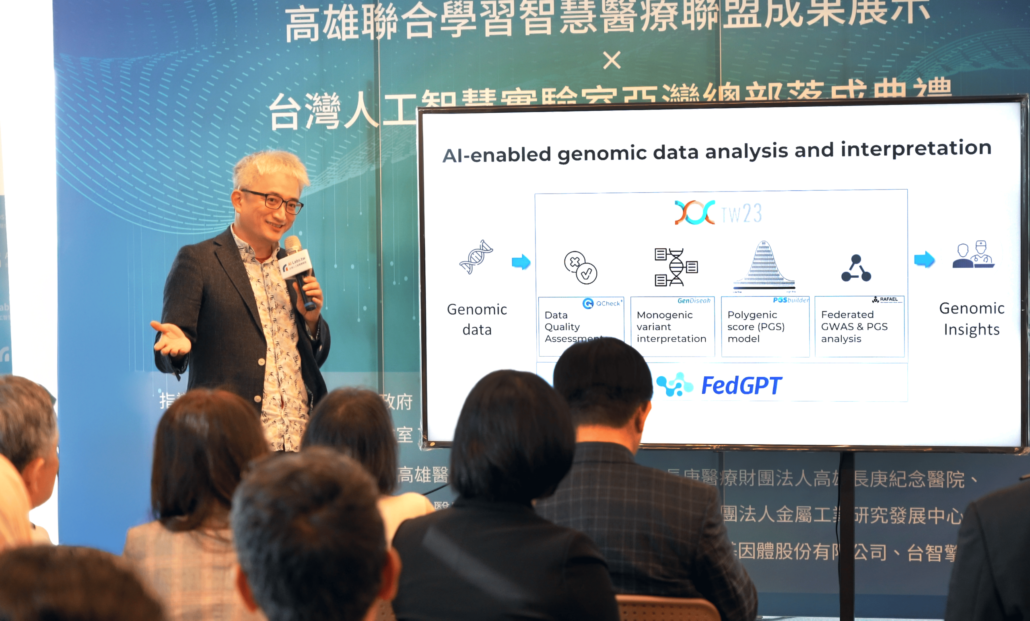AI “Mentor” Helps Nurses Clock Out on Time, Garnering a 90% Satisfaction Rate: Taiwan AI Labs and Hualien Tzu Chi Hospital Showcase Breakthroughs at 2024 Healthcare+ Expo
December 6, 2024 — The 2024 Healthcare+ Expo, Asia Pacific’s premier AI healthcare event, highlights the collaboration between Hualien Tzu Chi Hospital and Taiwan AI Labs, unveiling three cutting-edge innovations: the FedGPT-powered system for nursing shift handovers and care summaries, AI-generated admission and discharge records, and a virtual health educator fluent in Taroko language. These innovations drew significant attention at the expo.
President of Hualien Tzu Chi Hospital Lin Hsin-Jung noted, “Even our international colleagues in Tzu Chi are amazed by Taiwan’s advanced progress.” As the only medical center in eastern Taiwan, the hospital handles over 800,000 patient visits annually, supported by a team of more than 1,000 nurses. Since integrating AI-powered solutions from Taiwan AI Labs, FedGPT has demonstrated an accuracy rate of over 80% in creating care records and shift handovers, significantly reducing the workload on nursing staff and earning a satisfaction score of 4.7 out of 5.
、台灣人工智慧實驗室創辦人杜奕瑾(中)與花蓮慈濟醫院副院長吳彬安(右)合影。-1030x686.jpg)
Photo Caption: Hualien Tzu Chi Hospital President Lin Hsin-Jung (left), Taiwan AI Labs Founder Ethan Tu (center), and Hualien Tzu Chi Hospital Vice President Wu Pin-An (right) pose for a group photo.
FedGPT Streamlines Nursing Tasks: AI “Mentor” Supports New Nurses in Timely Shift Handovers
Hualien Tzu Chi Hospital’s Director of Nursing, Chung Hui-Chun, emphasized the challenges that new nurses face, particularly during shift handovers, where detailed documentation of patient conditions, vital signs, and care priorities for the next eight hours is essential. Traditionally, this process relied on senior nurses dictating key points while junior nurses manually recorded the information—a labor-intensive process prone to errors and omissions, extending working hours and impacting care quality.
與花蓮慈濟醫院護理部主任、虛擬衛教師原型鍾惠君(右)合影。-1030x686.jpg)
Photo Caption: Taiwan AI Labs Founder Ethan Tu (left) and Hualien Tzu Chi Hospital Director of Nursing and Virtual Health Educator Prototype Lead, Chung Hui-Chun (right), pose for a photo.
With FedGPT, nurses can now record conversations and generate comprehensive shift handover notes at the press of a button. These notes include actionable reminders, such as medication schedules or upcoming check-ups, presented in a structured format. Acting as a “virtual mentor,” FedGPT not only compiles reports but also ensures essential tasks are not overlooked.

Photo Caption:With a single press of the recording button, FedGPT can analyze doctor-patient conversations to summarize medical conditions and generate shift handover records.
Chung observed that many junior nurses, who completed their internships online during the COVID-19 pandemic, required three to four months of hands-on guidance to become proficient. Some took nearly a year. With FedGPT’s support, nurses adapt more quickly, enabling experienced staff to focus on critical tasks and improving overall team efficiency. This advancement aligns with the hospital’s vision of a “new normal” for nursing: seamless handovers and on-time clock-outs.
FedGPT: Pioneering Medical GPT Technology with Precision and Security
Developed by Taiwan AI Labs, FedGPT is a globally unique generative AI model integrating automatic speech recognition (ASR), text-to-speech (TTS), virtual avatars, and a federated learning platform. Tailored for healthcare, the model was trained on over 15 billion biomedical tokens, ensuring domain-specific expertise.
As AI adoption grows in healthcare, safeguarding sensitive medical data and mitigating algorithmic bias are critical challenges. Ethan Tu, founder of Taiwan AI Labs, highlighted the organization’s commitment to privacy protection through federated learning—a model-sharing approach that avoids data sharing. This ensures hospitals can train robust medical models without compromising patient confidentiality.
Despite using fewer computational resources, FedGPT achieves exceptional performance. In benchmarking tests using the Open Medical-LLM dataset, FedGPT Pro demonstrated superior medical knowledge comprehension among 14-billion parameter models, rivaling larger-scale models like GPT-4. Its efficient design also supports ESG goals by minimizing energy consumption.
Since deploying AI-assisted nursing solutions six months ago, Hualien Tzu Chi Hospital has continuously refined its systems based on frontline feedback. Notable achievements include the virtual health educator’s ability to provide guidance in 18 languages, including Taroko—a global first. Patients’ suggestions, such as incorporating friendlier avatar expressions, have also led to thoughtful enhancements, demonstrating the hospital’s dedication to integrating warmth into healthcare technology.
Director Chung Hui-Chun expressed optimism about AI’s transformative potential: “By alleviating repetitive tasks, empowering patients, and equipping nurses with advanced tools, AI can redefine healthcare delivery. Supporting our nurses today ensures a healthier future for all.”
About FedGPT
FedGPT (https://yating.tw/zh-hant/fedgpt-landing) is an advanced large-language model developed by Taiwan AI Labs. Built using over 100 billion Traditional Chinese tokens, it emphasizes trustworthy AI principles, leveraging internal knowledge bases and federated learning for validated and reliable outputs.
About Taiwan AI Labs
Taiwan AI Labs (https://ailabs.tw) pioneers trustworthy AI solutions, integrating generative AI across healthcare, federated learning, virtual avatars, and other applications. The lab’s research spans AI music, speech recognition, and media analysis, earning recognition in leading international journals. By uniting talent, resources, and industries, Taiwan AI Labs drives AI innovation from Taiwan to the world.
Media Contact
Ellie Chen
PR, Taiwan AI Labs
Email: wanhsin.chen@ailabs.tw










,台灣人工智慧實驗室受邀參展並由創辦人杜奕瑾發表演說,分享台灣應用AI科技打擊資訊的經驗.jpg)